10 start with L start with L
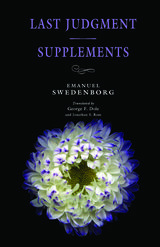
This volume comprises two short works, originally published separately, which describe the Last Judgment as Swedenborg claims to have witnessed it over the course of many months in 1757. In Last Judgment, first published in 1758, Swedenborg lays out how and why the Last Judgment occurred, explaining that history can be divided into a series of spiritual ages or churches. At the end of each age, evil threatens to overwhelm both the physical and the spiritual worlds, and the Lord restores balance between good and evil with a “Last Judgment.” Thus the 1757 Last Judgment, Swedenborg says, applied only to the souls of people who had lived since the time of Christ, and the reformation of the spiritual world allowed humanity to enter the next age with a new understanding of religion. In the second half of Last Judgment, Swedenborg describes how various types of people were judged, a theme he continues in the 1763 short work Supplements.
The new spiritual age that Swedenborg saw emerging during his lifetime is one of the foundational themes in his theology (a theme he explores more deeply in his later work, Revelation Unveiled, which is a commentary on the book of Revelation). In Supplements, Swedenborg succinctly introduces his understanding of the connection between heaven and earth and of how that connection plays out over the course of human history.
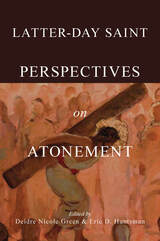
The Church of Jesus Christ of Latter-day Saints and other Christians have always shared a fundamental belief in the connection between personal salvation and the suffering, death, and resurrection of Jesus Christ. While having faith in and experiencing the atonement of Christ remains a core tenet for Latter-day Saints, some thinkers have in recent decades reconsidered traditional understandings of atonement.
Deidre Nicole Green and Eric D. Huntsman edit a collection that brings together multiple and diverse approaches to thinking about Latter-day Saint views on this foundational area of theology. The essayists draw on and go beyond a wide range of perspectives, classical atonement theories, and contemporary reformulations of atonement theory. The first section focuses on scriptural and historical foundations while the second concentrates on theological explorations. Together, the contributors evaluate what is efficacious and ethical in the Latter-day Saint outlook and offer ways to reconceive those views to provide a robust theological response to contemporary criticisms about atonement.
Contributors: Nicholas J. Frederick, Fiona Givens, Deidre Nicole Green, Sharon J. Harris, J.B. Haws, Eric D. Huntsman, Benjamin Keogh, Ariel Bybee Laughton, Adam S. Miller, Jenny Reeder, T. Benjamin Spackman, and Joseph M. Spencer
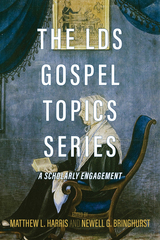
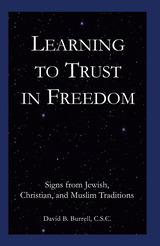
True religious faith cannot be confirmed by any external proofs. Rather, it is founded on a basic act of trust—and the common root of that trust, for Jewish, Christian, and Islamic traditions, is a belief in the divine creation of the universe. But with Learning to Trust in Freedom, David B. Burrell asks the provocative question: How do we reach that belief, and what is it about the universe that could possibly testify to its divine origins? Even St. Augustine, he points out, could only find faith after a harrowing journey through the lures of desire—and it is that very desire that Burrell seizes on as a tool with which to explore the origin and purpose of the world. Delving deep into the intertwinings of desire and faith, and drawing on St. John of the Cross, Edith Stein, and Charles Taylor, Burrell offers a new understanding of free will, trust, and perception.

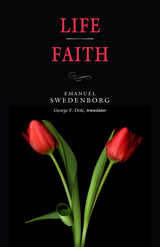
Life refers not to the life force that sustains us but to the way we live our lives. This short piece focuses on the concept of regeneration, or spiritual rebirth, as a process of consciously rejecting our own destructive impulses and internalizing love and goodness. It argues that the choices we make and the reasons we make them have everything to do with our salvation. Swedenborg includes a brief overview of the inner sense of the Ten Commandments as a way to understand the nature of the choice between good and evil.
In Faith, Swedenborg rejects the notion that faith can be a choice to believe things that make no rational sense. Instead, he defines faith as an inner recognition of what is actually true. He explores the complex relationship between faith and knowledge, and emphasizes that true faith can occur only in people who love others and treat them well.
Life / Faith is part of the New Century Edition of the Works of Emanuel Swedenborg (NCE), an ongoing translation series. The NCE series incorporates the latest scholarship and translation standards for a more accurate and accessible rendering of Swedenborg’s works. Traditionally titled The Doctrine of Life and The Doctrine of Faith, these short works are often published together with two others—The Lord and Sacred Scripture—under the title The Four Doctrines. These four titles will be published together in the forthcoming NCE hardcover annotated volume The Shorter Works of 1763.
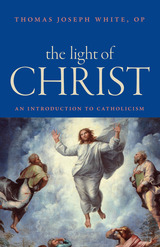
At the same time, The Light of Christ also addresses topics such as evolution, the modern historical study of Jesus and the Bible, and objections to Catholic moral teaching. Touching on the concerns of contemporary readers, Fr. White examines questions such as whether Christianity is compatible with the findings of the modern sciences, do historical Jesus studies disrupt or confirm the teaching of the faith, and does history confirm the antiquity of Catholic claims.
This book serves as an excellent introduction for young professionals with no specialized background in theology who are interested in learning more about Catholicism, or as an introduction to Catholic theology. It will also serve as a helpful text for theology courses in a university context.
As Fr. White states in the book’s introduction: “This is a book that offers itself as a companion. I do not presume to argue the reader into the truths of the Catholic faith, though I will make arguments. My goal is to make explicit in a few broad strokes the shape of Catholicism. I hope to outline its inherent intelligibility or form as a mystery that is at once visible and invisible, ancient and contemporary, mystical and reasonable.”
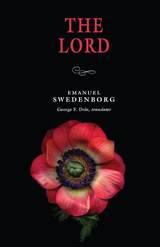
In his short work The Lord, Swedenborg presents an answer to the time-honored question of how Jesus and God are related: he argues that they became in every way one and the same. Throughout his works Swedenborg uses the term “Lord” to refer to Jesus as the embodiment of God. In this work he emphasizes that the traditional trinity of Father, Son, and Holy Spirit should be thought of not as three separate divine Persons that have always coexisted but as three aspects now present within one divine Person—Jesus in his resurrection.
The Lord also touches upon key themes in Swedenborg’s theology: the spiritual reasons why the Lord came to earth; the significance of the death and resurrection of his human form; and the ways in which his coming was foretold in the Old Testament. Throughout the book, Swedenborg provides extensive biblical references to support his arguments. He concludes with a brief chapter describing the New Jerusalem, a reference to both the city described in the book of Revelation and the new spiritual age that is now unfolding.
The Lord is part of the New Century Edition of the Works of Emanuel Swedenborg (NCE), an ongoing translation series. The NCE series incorporates the latest scholarship and translation standards for a more accurate and accessible rendering of Swedenborg’s works. Traditionally titled The Doctrine of the Lord, this short work is often published together with three other short works—Life, Faith, and Sacred Scripture—under the title The Four Doctrines. The Swedenborg Foundation will publish these four titles together in the forthcoming NCE hardcover annotated volume The Shorter Works of 1763.
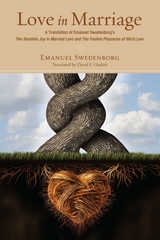
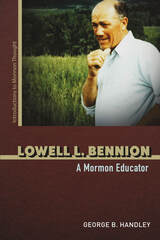
Known in his lifetime for a tireless dedication to humanitarian causes, Lowell L. Bennion was also one of the most important theologians and ethicists to emerge in the Church of Jesus Christ of Latter-day Saints in the twentieth century.
George B. Handley’s intellectual biography delves into Bennion’s thought and extraordinary intellectual life. Rejecting the idea that individual LDS practice might be at odds with lived experience, Bennion insisted the gospel favored the growth of individuals acting and living in the present. He also focused on the need for ongoing secular learning alongside religious practice and advocated for an idea of social morality that encouraged Latter-day Saints to seek out meaningful transformations of character and put their ethical commitments into practice. Handley examines Bennion’s work against the background of a changing institution that once welcomed his common-sense articulation of LDS ideas and values but became discomfited by how his thought cast doubt on the Church’s beliefs about race and other issues.
READERS
Browse our collection.
PUBLISHERS
See BiblioVault's publisher services.
STUDENT SERVICES
Files for college accessibility offices.
UChicago Accessibility Resources
home | accessibility | search | about | contact us
BiblioVault ® 2001 - 2025
The University of Chicago Press









